Justin Taylor's Blog, page 137
September 26, 2013
Answering Moral Objections to the Old Testament
Two talks by Peter Williams—warden of Tyndale House in Cambridge, England—delivered in September 2013 at Southeastern Baptist Theological Seminary on moral objections to the OT (including genocide and slavery):
Mark Noll’s Top 5 Biographies
I am beginning a new series today, looking at worthwhile and favorite biographies recommended by leading experts. You’ll be able to access the whole series here.
First up is Mark Noll, Francis A. McAnaney Professor of History at Notre Dame, one of our foremost scholars of religious and cultural history.
I asked for the top five biographies that best represent the genre at its best, with a little explanation for each.
1. Malcolm Muggeridge, The Chronicle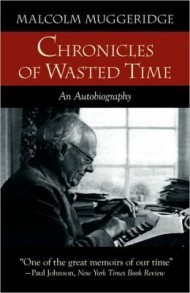 s of Wasted Time, 2 vols. (vol. 1, The Green Stick; vol. 2, The Infernal Grove)
s of Wasted Time, 2 vols. (vol. 1, The Green Stick; vol. 2, The Infernal Grove)
This is a great book, although what kind of great book is hard to say. Muggeridge presented this two-volume work as an autobiography, but the books are selective to the point of fiction and strongly back-loaded to reflect Muggeridge’s opinions as they had come to develop by the 1970s. Doubts as to genre notwithstanding, the volumes are as crisp an evisceration of the modern Zeitgeist as one could possibly hope to read. Muggeridge knew almost everyone of note in Britain and also in many other places of the world. As told here, his life was a perpetual series of disillusionments with the gods of the age (Fabianism, Marxist socialism, western affluence) and a progressive self-understanding of what it meant as a journalist extraordinaire, even in the most secular of centuries, to be haunted by God.
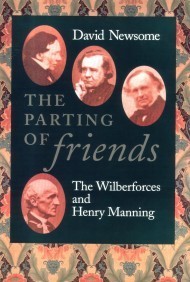 2. David Newsome, The Parting of Friends: The Wilberforces and Henry Manning. London: John Murray, 1966 (reprinted with this title by Eerdmans in 1993; the first American printing was by Harvard University Press in 1966 under the title The Wilberforces and Henry Manning).
2. David Newsome, The Parting of Friends: The Wilberforces and Henry Manning. London: John Murray, 1966 (reprinted with this title by Eerdmans in 1993; the first American printing was by Harvard University Press in 1966 under the title The Wilberforces and Henry Manning).
Newsome’s multiple biography is an old-fashioned kind of history about old-fashioned kind of people. His subjects lived in the luminous circle created by the household of William Wilberforce in the first half of the nineteenth century. This circle was made up of several of Wilberforce’s children, their friends and colleagues, and their sisters and sisters’ friends, themselves a remarkable group of Victorian women. The plot line is the story of the drift from the sturdy evangelicalism of the older Wilberforce to high church Anglicanism and then, for some under the guidance of John Henry Newman, to the Roman Catholic church. The poignancy of the story is the combination of intense fraternal devotion and painful ecclesiastical separation. When some in this circle remained Anglican, the result was broken relationships in homes, colleges (most were connected to Oxford), and the church. Newsome’s gift is to shape the treasure trove of letters left by the participants (they were scribbling away all the time) into a compelling narrative that, while it solves no problems of theology or church loyalty, nonetheless demonstrates the profound humanity of those who engaged those issues in that corner of Victorian England a century and a half ago.
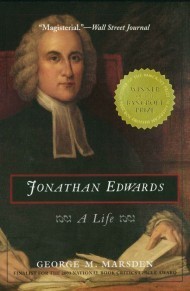 3. George Marsden, Jonathan Edwards: A Life (Yale University Press, 2003).
3. George Marsden, Jonathan Edwards: A Life (Yale University Press, 2003).
Marsden succeeds in bringing biography to theology and theology to biography with unusual clarity about both the person and the times.
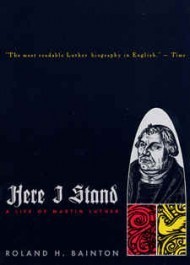 4. Roland Bainton, Here I Stand: A Life of Martin Luther
4. Roland Bainton, Here I Stand: A Life of Martin Luther
Newer scholarship has altered details (the book was first published in 1950), but it remains a captivating account of a life-changing person in a life-changing era.
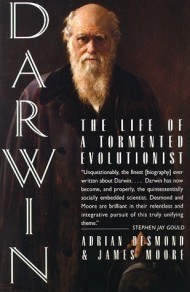 5. Adrian Desmond and James Moore, Darwin: The Life of a Tormented Evolutionist
5. Adrian Desmond and James Moore, Darwin: The Life of a Tormented Evolutionist
This biography offers scintillating history of science-with-culture for one of the most important thinkers of the modern period.
RUNNERS UP (some very close):
Bruce Hindmarsh, John Newton and the English Evangelical Tradition: Between the Conversions of Wesley and Wilberforce
Allen C. Guelzo, Abraham Lincoln: Redeemer President
Richard Carwardine, Lincoln: A Life of Purpose and Power
Heiko Oberman, Luther: Man Between God and Devil
H.G. Haile, Luther: An Experiment in Biography
E. Gordon Rupp, Luther’s Progress to the Diet of Worms
Peter Brown, Augustine of Hippo
G. K. Chesterton, Saint Thomas Aquinas—” The Dumb Ox”
Edmund S. Morgan, The Gentle Puritan: A Life of Ezra Stiles
John Pollock, Wilberforce
September 25, 2013
The Best Writing Advice You Will Hear Today
C.S. Lewis’s last interview was on May 7, 1963—six months before he died. Sherwood Wirt (1911-2001) asked for his writing advice: “How would you suggest a young Christian writer go about developing a style?”
Lewis responded:
The way for a person to develop a style is
(a) to know exactly what he wants to say, and
(b) to be sure he is saying exactly that.
The reader, we must remember, does not start by knowing what we mean. If our words are ambiguous, our meaning will escape him.
I sometimes think that writing is like driving sheep down a road. If there is any gate open to the left or the right the reader will most certainly go into it.
—C. S. Lewis, “Cross-Examination,” in C.S. Lewis: Essay Collection and Other Short Pieces, ed. Lesley Walmsley (London: HarperCollins, 2000), 555.
This is one of the reasons Lewis is still read today. Agree or disagree with what he’s saying, you don’t have to wonder what he thinks. This blessed clarity and precision is a gift we can emulate.
God Does Not Create All Pastors Equally
From a 2007 conversation with John Piper and John MacArthur, showing how different the two men are:
September 24, 2013
Mud, Windshield Wipers, and Windshield Washer :: Sin, Promises, and Spirit
John Piper, Future Grace (Sisters, OR: Multnomah, 1995), pp. 53-54:
Suppose you are in a car race and your enemy, who doesn’t want you to finish the race, throws mud on your windshield. The fact that you temporarily lose sight of your goal and start to swerve, does not mean that you are going to quit the race. And it certainly doesn’t mean that you are on the wrong race track. Otherwise the enemy wouldn’t bother you at all. What it means is that you should turn on your windshield wipers and use your windshield washer.
When anxiety strikes and blurs our vision of God’s glory and the greatness of the future that he plans for us, this does not mean that we are faithless, or that we will not make it to heaven. It means our faith is being attacked. At first blow, our belief in God’s promises may sputter and swerve. But whether we stay on track and make it to the finish line depends on whether, by grace, we set in motion a process of resistance—whether we fight back against the unbelief of anxiety. Will we turn on the windshield wipers and will we use our windshield washer?
. . . The windshield wipers are the promises of God that clear away the mud of unbelief, and the windshield washer fluid is the help of the Holy Spirit. The battle to be freed from sin, as we have seen, is “by the Spirit and by faith in the truth” (2 Thess 2:13). The work of the Spirit and the Word of the truth. These are the great faith builders.
Without the softening work of the Holy Spirit, the wipers of the Word just scrape over the blinding clumps of unbelief. Both are necessary—the Spirit and the Word. We read the promises of God and we pray for the help of his Spirit. And as the windshield clears so that we can see the welfare that God plans for us (Jer 29:11), our faith grows stronger and the swerving anxiety smooths out.
Suffering and the Steady, Faithful Preaching of the Word of God
Wisdom from Paul Wolfe:
The Best Deal for Crazy Busy, Outtakes of Our Mock Interview, and Free Giveaways
This is the best deal I’ve seen on Kevin DeYoung’s new book, Crazy Busy: single copies for $6 (50% off), five or more copies for $5 (58% off).
Crossway is also giving away some things (like a free e-book copy and study guide) to folks who buy the book within the first two weeks, with the first 1,000 also getting a free copy of Kevin’s next book. More details here.
By the way, several folks have asked how Kevin and I managed to keep a straight face throughout our mock video interview.
Here’s the answer: we didn’t. Watch below if you want to see what it was really like to try to film this. Hats off to Crossway videographers Josh Dennis, Jon Marshall, and Tim Kellner for editing together something coherent from this mess:
September 20, 2013
What Is the Front Porch?
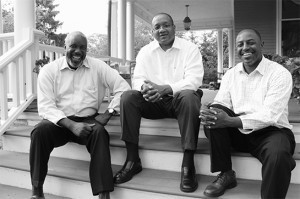 Tony Carter, writing for the new website and ministry he has started with Thabiti Anyabwile and Louis Love:
Tony Carter, writing for the new website and ministry he has started with Thabiti Anyabwile and Louis Love:
Many people fondly remember growing up in a house with a front porch.
I was raised in rural Michigan, just north of the “big city” of Grand Rapids, amidst the glistening lakes and rowed pines of Newaygo County. My family’s house was located on a dirt road for most of the year and a snow-packed road for the rest. It was a few steps from the front porch of our small but warm home. The porch wasn’t much to talk about. That’s why it fit the house perfectly. Like the house, the porch’s worth wasn’t in the structure, but in how it served my family and our neighborhood. Our porch didn’t just welcome people to the house; it welcomed them to our home. It welcomed them to our lives. It was the portal to conversation for all things family and community.
You will experience conversations about faith, family, fellowship, and food, just like the front porches when we were growing up.
Not everyone has a front porch. I bet almost everyone has places where friends, family, and even foes gather for conversation and debate. Such places serve a similar unifying and comforting purpose. We hope you experience those same kinds of conversations here. And that’s what we want to accomplish. Welcome!
The Front Porch aims to be a place for conversations on biblical faithfulness in African-American churches and beyond.
Read the whole thing here, and check out the full website.
September 19, 2013
Lewis and Tolkien Debate Myths and Lies
On Twitter, @TonyReinke points out that “On the evening of September 19, 1931, JRR Tolkien and CS Lewis went for a walk, one of the most important walks in church history.”
Here’s a dramatic reenactment of their conversation, which attempts to capture the issues if not the exact conversation itself:
September 18, 2013
A Gospel-Centered Systematic Theology
New Testament scholar Mike Bird offers an intriguing introduction to his new book, Evangelical Theology: A Biblical and Systematic Introduction (Zondervan, 2013):
Justin Taylor's Blog
- Justin Taylor's profile
- 44 followers




